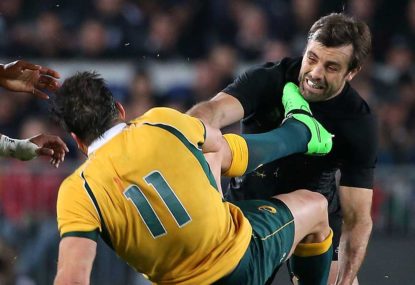I’m content. In the first few minutes after the Rugby World Cup final, I didn’t think I would be. But I am now.
Getting beaten in a final is never a good feeling, but the reality is this year has been one long, upward ride. In perspective, this final loss is a small, downward dip at the end of a year that turned out better than we thought it would.
In the fullness of time it may turn out to be a small dip in the grand scheme of a larger Wallabies resurgence.
A lot of players are entering the beginning of their prime – that sweet spot where experience and physical prowess converge in just the right way. The bulk of this vastly improved squad will still be in good condition come 2019.
Michael Hooper, Israel Folau, Bernard Foley, Kurtley Beale, Tevita Kuridrani, Rob Simmons, Kane Douglas, James Slipper, Scott Sio and Will Skelton will all be 30 or younger.
David Pocock will be 31, and with his injuries that will either feel like 35 due to wear and tear, or 28 because he had two years off without the physical toll of constant contact.
That is a great core of grizzled veterans who can look forward to one big, final tilt at the peak of world rugby in four years.
Which brings me to this year’s champions.
The All Blacks played that grand final like a bunch of grizzled veterans. Not so much by deploying the dark arts or anything shady, but their self-control, accuracy and tactical nous was sublime. Near perfect.
The way they forced a weary Wallabies side to play everything out from their own end was genius. These young, energetic Wallabies played a tournament of five-setters and in the final were either running it from or tackling in their own half, under threat of penalty punishment. That’s a winning position for an older team that might weary sooner if the circumstances were flipped.
Apart from one poor box-kick, New Zealand’s territorial dominance was complete.
The ability of the All Black forwards with the ball in hand was a standout. They made 19 breaks in the match, many of them on the back of continued short passing and offloading in the middle of the park. If you keep attracting a man and passing late, you’re eventually going to find air, and that was repeated over and over again. If a team is to begin consistently challenging the All Blacks they must match their ball movement among the forwards.
Specific game planning around the presence of David Pocock, first, and Michael Hooper and Scott Fardy, second, succeeded in a way no other team has managed. As Rod Kafer pointed out during the match, the All Blacks repeated reversion to the blind side was a defining aspect of the match that won’t be exalted enough.
Using the blind side was how the All Blacks built pressure, keeping it away from the man who would make that impossible, while wearing down some of the smaller Wallabies defenders who ordinarily try to avoid contact out on those fringes. If something doesn’t favour you, tilt the playing field in your direction.
I said before the match that the return of Pocock to the Wallabies was the biggest change to occur in world rugby this year, the second biggest was certainly the All Blacks’ ability to nullify that.
They flogged the Wallabies. It was an imperious, measured and dominant performance by the All Black vets. And it wouldn’t be any other way for a team seeking to repeat their championship status.
If champagne rugby at every turn is your standard for the best national rugby team ever, then this All Blacks team might not be your choice. But if your standard is the ability to win and win and win, with the added capacity to adjust tactically for any opponent’s strength in all conditions, then you can mount a very strong argument.
Losing to this team hurts but provides a template for where the Wallabies can go from here. They’ve steadily improved the scrum, although the lineout needs work. Attacking planning has picked up. Trust in defence now burns bright in the centre of the team ethos. Now they must add the forward interplay that sucks the opposition dry, and the tactical awareness that moves the game onto a footing suited to your strengths.
Farewell to the 2015 Rugby World Cup, the best rugby tournament in my lifetime.
Quick-tap Rugby World Cup highlights
Dan Carter
I’ve always said Richie McCaw is the heart of the All Blacks and Carter the heart of the Crusaders. But it’s hard to go past a 33-year-old flyhalf who has ice in his veins and still the energy to cut you to ribbons.
Japan
My team of the tournament. They set the tournament alight, brought second-tier rugby onto centre stage, and provided the Cinderella moment you’ll never forget. Three wins and they were closer to Scotland than the score suggests.
Argentina
Since they’ve joined the premier non-World Cup national tournament, the improvement has been massive. Their play was electric and brutal, opportunistic and entrepreneurial.
Tries
This was the World Cup where everyone decided they were the goal, not penalties.
Short-arm Rugby World Cup lowlights
Video referee
I know, it’s a thankless job, but we still need to sort this out. There are rules and logic and common sense, and at the moment they’re all overlapping and then leaving gaps in other places.
England
Knocked out of the pool stage at home. Doesn’t get much more disappointing than that.
Five-week suspension
What world are we living in where Alesana Tuilagi is dealt a five-week suspension for what he did? There are more dangerous and malicious acts that happen every five minutes in a rugby game.





























































































